
Corporate wellness is not just a trend; it’s a movement towards creating a more vibrant, healthy, and engaged workforce. Yoga, with its unique blend of physical postures, breathing techniques, and meditation, offers a comprehensive solution that addresses both the physical and psychological demands of today’s corporate environment. By integrating yoga into their wellness programs, companies are recognizing the value of not only supporting their employees’ health but also enhancing their overall productivity and satisfaction.
The Benefits of Corporate Yoga
For the Business
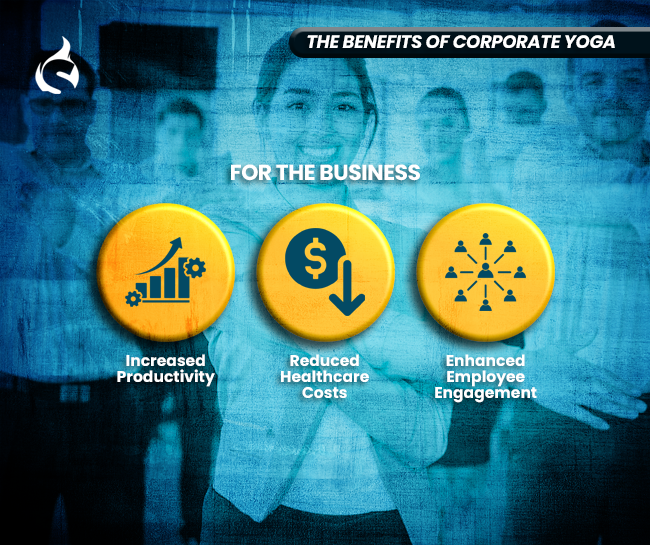
- Increased Productivity: Regular yoga sessions contribute to greater focus and efficiency among employees.
- Reduced Healthcare Costs: Yoga’s preventative health benefits can lead to lower healthcare expenses for companies.
- Enhanced Employee Engagement: Yoga programs demonstrate a company’s commitment to employee well-being, fostering loyalty and a positive work culture.
For Employees

- Stress Reduction: Yoga provides effective tools for managing stress, a common challenge in the corporate world.
- Improved Physical Health: Regular practice can lead to better overall physical health, reducing the risk of chronic diseases.
- Enhanced Mental Clarity: The meditative aspects of yoga promote mental clarity and concentration, essential for today’s knowledge workers.
Psychological and Physical Benefits
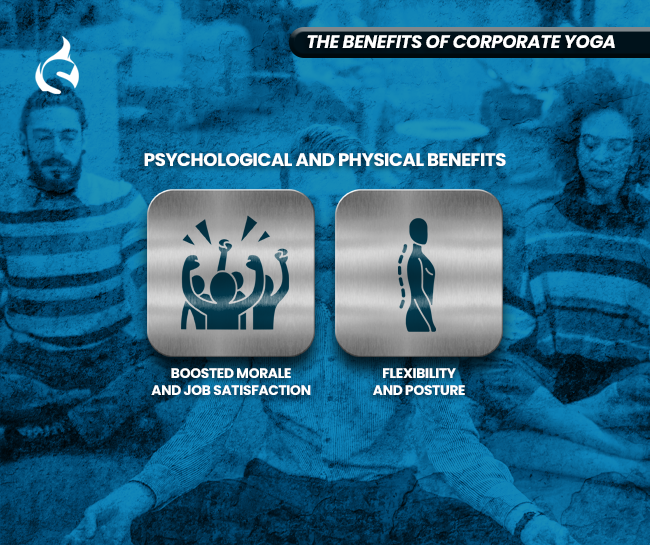
- Boosted Morale and Job Satisfaction: Yoga can significantly enhance mood and job satisfaction, leading to a more harmonious workplace.
- Flexibility and Posture: Regular yoga practice improves flexibility and posture, critical for employees who spend long hours at a desk.
Identifying Your Target Corporate Audience
Effectively targeting your corporate audience requires a nuanced understanding of the corporate landscape. It’s not just about selling yoga; it’s about solving problems for businesses through yoga. Differentiating between types of businesses and their unique needs is crucial for tailoring your approach.
Small Businesses vs. Large Corporations
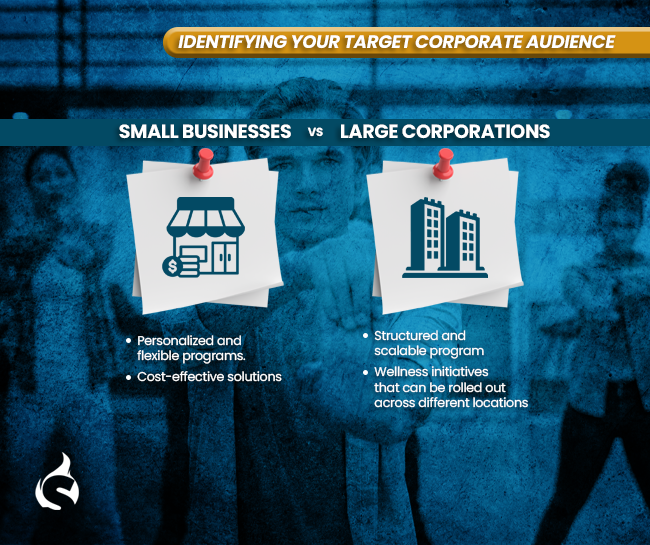
- Small Businesses: Typically value personalized, flexible programs. They are often looking for cost-effective solutions that can adapt to their dynamic nature.
- Large Corporations: Prefer structured, scalable yoga programs. They may prioritize wellness initiatives that can be rolled out across multiple departments or locations.
Industry-Specific Approaches
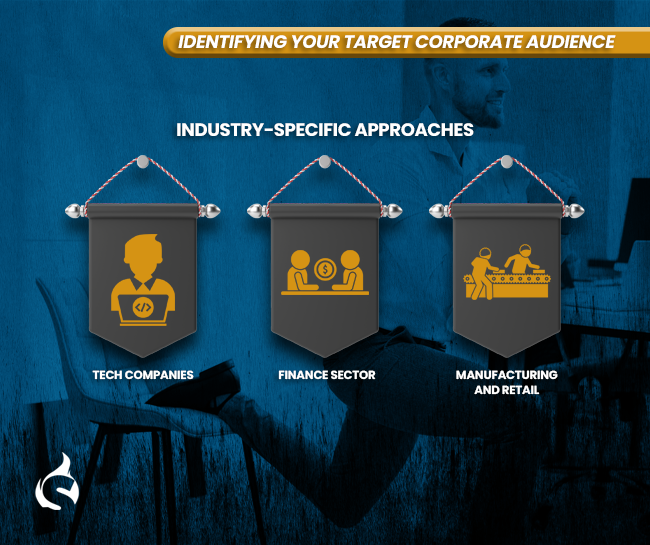
Tailoring your yoga offerings to the specific industry of a potential client can significantly enhance the appeal of your proposal. Here’s how you might approach different sectors:
- Tech Companies: May focus on stress reduction and enhancing creativity among employees.
- Finance Sector: Often interested in high-energy classes that help manage stress and long working hours.
- Manufacturing and Retail: Might prioritize physical well-being to reduce injury rates and absenteeism.
Understanding Corporate Culture
Grasping the nuances of a company’s culture is essential. A more conservative organization might be initially skeptical about the benefits of yoga. In contrast, a startup might be open to innovative wellness solutions. Your proposal should speak directly to these cultural aspects.
Decision-Makers
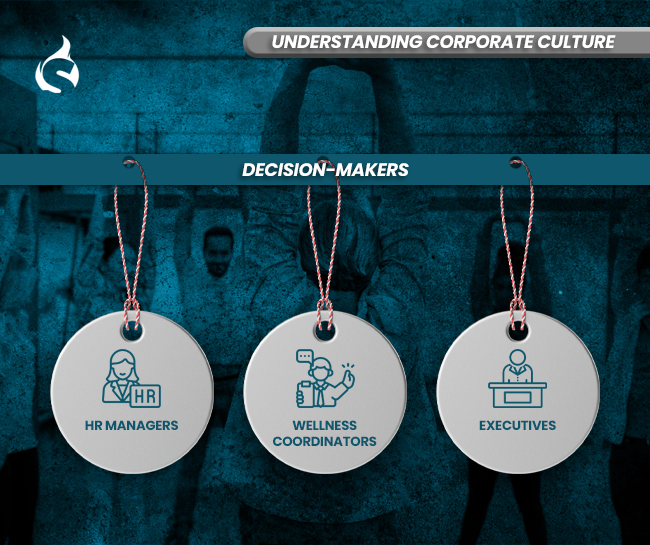
- HR Managers: Often the first point of contact for wellness programs. They look for programs that can improve overall employee satisfaction and health.
- Wellness Coordinators: Specifically focused on implementing wellness initiatives. They appreciate detailed, evidence-based proposals.
- Executives: Need to see the bottom-line impact of wellness programs. Highlight how yoga can improve productivity, reduce healthcare costs, and enhance employee retention.
💡 By segmenting your target audience and understanding the unique characteristics and needs of each segment, you can tailor your marketing and proposal efforts more effectively. This approach not only improves your chances of securing corporate clients but also helps in creating more impactful, beneficial yoga programs tailored to each business’s specific needs.
Crafting an Irresistible Corporate Yoga Proposal
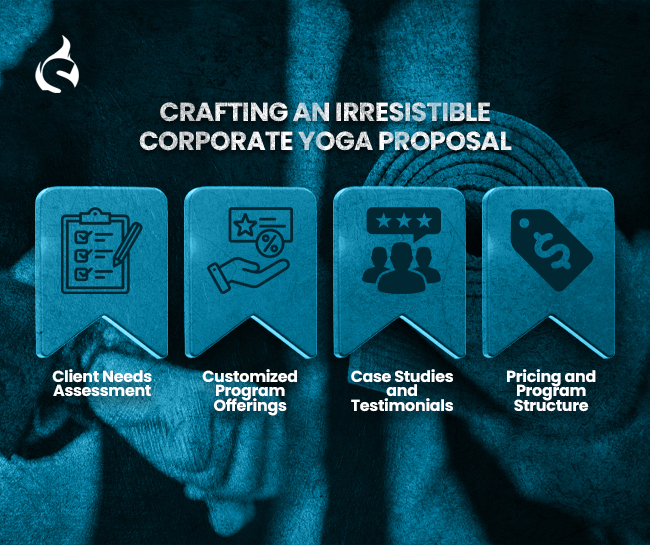
A compelling proposal is your first step towards securing a corporate yoga client. It should clearly articulate the benefits of your yoga program, tailored to the specific needs and objectives of the company. Include elements such as:
- Client Needs Assessment: Show that you understand their unique challenges and objectives.
- Customized Program Offerings: Detail how your yoga sessions can be tailored to meet these needs.
- Case Studies and Testimonials: Provide evidence of success from similar businesses to build credibility.
- Pricing and Program Structure: Offer clear, transparent pricing and program structures that fit the corporate budget and schedule.
Marketing Your Corporate Yoga Services
Digital Marketing Strategies
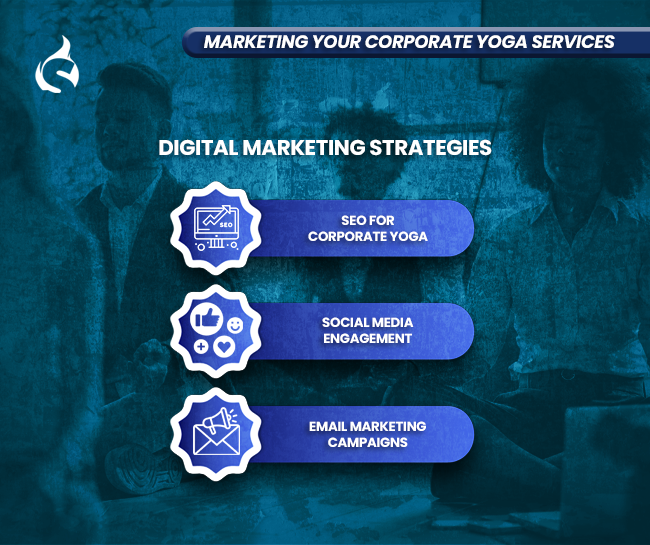
- SEO for Corporate Yoga: Optimize your website and content with keywords like “corporate yoga sessions” and “how to sell corporate yoga online” to attract organic search traffic.
- Social Media Engagement: Share success stories, testimonials, and engaging content related to corporate yoga on platforms like LinkedIn and Instagram to build your brand presence.
- Email Marketing Campaigns: Send targeted campaigns to a curated list of corporate contacts, offering insights into the benefits of corporate yoga programs and inviting them to a free demo session.
Traditional Marketing Approaches
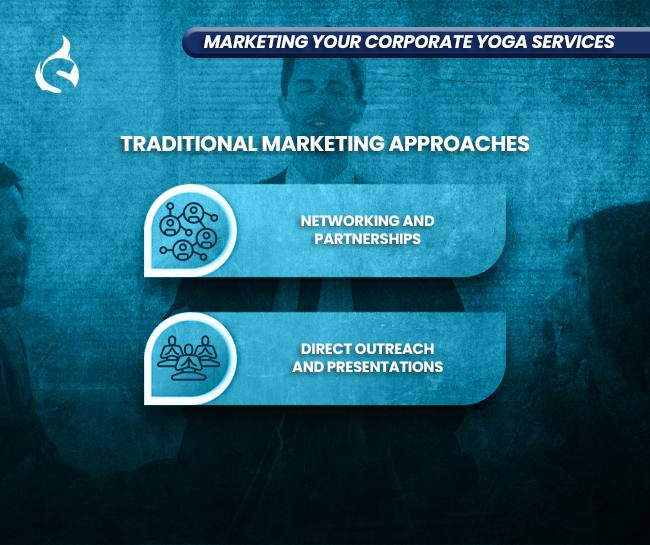
- Networking and Partnerships: Attend business events and wellness fairs to build relationships with corporate wellness managers and HR professionals.
- Direct Outreach and Presentations: Offer to conduct free workshops or presentations on the benefits of yoga in the workplace to potential clients.
Creative Marketing Ideas
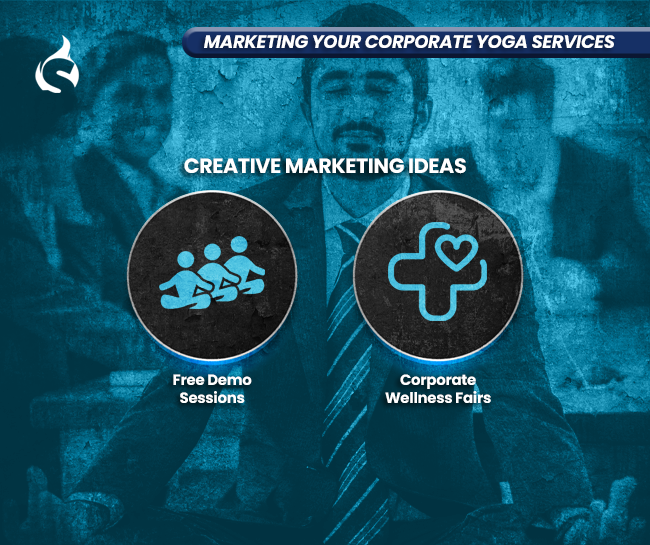
- Free Demo Sessions: Host free yoga classes for businesses to give them a firsthand experience of your program.
- Corporate Wellness Fairs: Participate in or organize wellness fairs within corporate complexes to showcase your services.
Selling Corporate Yoga: The Consultation Process

The consultation is a critical moment to convert interest into commitment. Prepare by researching the company and its wellness goals. During the meeting, focus on listening to their needs, customizing your offerings accordingly, and addressing any objections with clear, benefits-focused responses. Finalizing the deal often requires flexibility in scheduling, pricing, and program customization.
Maintaining and Growing Corporate Yoga Relationships

After securing a corporate client, focus on delivering exceptional value and maintaining strong communication. Regular feedback sessions can help tailor the program to evolving needs. Upselling additional services or renewing contracts becomes easier with a track record of success. Encourage satisfied clients to refer your services and request testimonials to bolster your marketing efforts.
As the corporate world increasingly recognizes the value of holistic wellness programs, the demand for corporate yoga is set to grow. By adopting the strategies outlined in this guide
Revamp your corporate yoga offerings seamlessly with Spark Membership Software today and unlock your studio’s full potential. Simplify scheduling, payments, and client management effortlessly, allowing you to devote more time to teaching yoga. Ignite your studio’s growth with Spark Membership Software now.